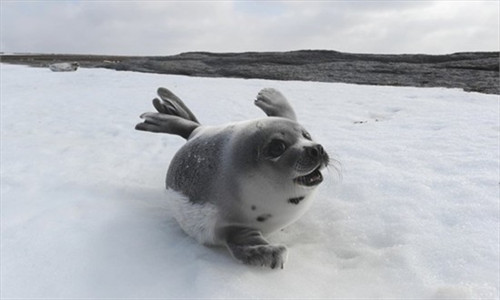
A young harp seal on Prince Edward Island in the Northern Gulf of St Lawrence, Canada. Conservationists have warned of dangers to the species owing to climate change and commercial seal hunt. Photo: CFP
Animal rights organizations are gearing up to protest what they suspect may be an attempt by Canada to further promote the selling of seal products, during an upcoming visit to China by Canadian Prime Minister Stephen Harper on February 7.
The activists suspect that as a number of territories, including the EU and Russia, have banned imports of seal products, Canada is looking to China to fill the void.
"We demand the embassy confirm if the visit will include promotion of seal products, which would be totally immoral and shameless," said Liu Huili, program manager for environmental NGO Green Beagle. Liu asked the Embassy of Canada for an answer through their official microblog account Tuesday.
The Canadian government announced the visit two weeks ago, saying they are "committed to moving the relationship forward by opening new markets." China's Ministry of Foreign Affairs confirmed the visit yesterday, and said they expected the visit would "boost the strategic partnership in wide-ranging areas."
Liu's microblog post was forwarded 400 times, and she told the Global Times yesterday they would gather public opinion on the issue before writing a letter to the embassy to hand in to the prime minister next week.
Wu Long, a publicity officer at the Canadian embassy, said yesterday they were unaware of the microblog discussion, but would try to take a look at the comments, if time permitted, as they were busy planning the prime ministerial visit.
Last November, China postponed signing a deal to import Canadian seal meat according to a Canadian Broadcasting Corporation (CBC) report. Some believe that the visit would aim to reopen the seal meat negotiations.
"In the wake of international bans on the sale of seal products, including Russia banning imports and exports recently, it's unacceptable the Canadian government has turned to China in continuous attempts to create a new market here," said Qin Xiaona, director of the Capital Animal Welfare Association.
"It will paint us as having no interest in animals, except in their meat and fur. It will also seriously endanger the approximately remaining 1,000 existing spotted seals in Liaodong Bay [Bohai Bay]," Qin noted.
Qin said they had put a lot of effort to appeal to Chinese authorities, including sending letters to Chinese Premier Wen Jiabao, but have so far received no reply.
However, comments from Wan Jifei, director of the China Council for the Promotion of International Trade may comfort the activists a little.
"Chinese can trade internationally and take responsibility for world environment and animal protection, such as seal products, which is seriously about our nation's image," said Wan, "we won't and should not do anything harmful to the environment."
International animal rights organizations have long protested the annual Canadian seal hunt. According to Canadian law, it is forbidden to kill harp or other seals until they start to molt, usually at 13 to 15 days old. Most are killed aged under three months.
Last year, Canadian sealers killed 37,609 seal pups, and the kill in 2010 was 67,000, while the Canadian Department of Fisheries and Oceans set the quota as 330,000, said Canadian anti-seal hunt NGO Harpseals.org.
According to a CBC report last November, Canada's fisheries minister thinks Chinese officials know how important the on-hold meat deal is to Canada, and hopes to "resolve the outstanding issues in time for the annual seal hunt in spring."
"The visit is at a very crucial time, and the international boycott means the sealers couldn't find more buyers, and now they come to China. We have every reason to be suspicious and take action," said Liu.

Copyright ©1999-2011 Chinanews.com. All rights reserved.
Reproduction in whole or in part without permission is prohibited.